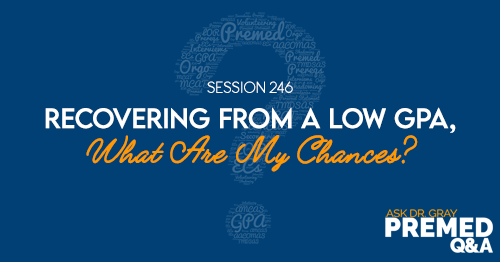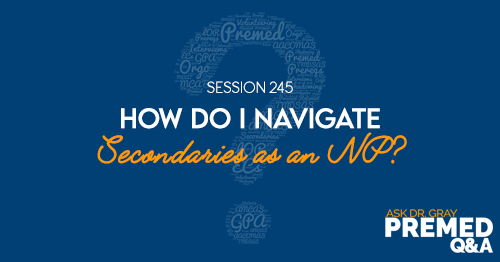Apple Podcasts | Google Podcasts
Session 135
Today’s student has been dealing with family/personal issues. Even with an upward trend, her GPA of 2.5 will only get her a rejection. What should she do now?
Listen to this podcast episode with the player above, or keep reading for the highlights and takeaway points.
The episodes in this podcast are recordings of our Facebook Live that we do at 3 pm Eastern on most weekdays. Check out our Facebook page and like the page to be notified. Also, listen to our other podcasts on MedEd Media. If you have any questions, call me at 617-410-6747.
[00:24] Question of the Day
“I got a transcript that spans four states because of the army. Technically that usually it’s the service member that’s pursuing the degree and that’s what I’ve mostly heard about on your podcast. But now, the spouse is the one doing it and she’s married to the service member. So with that comes some difficulties, like the switching of schools all the time. And also I have a five year old daycare, and childcare and all of this.
Because of my lengthy transcripts, I do not have a good repertoire. I’ve been out of school long enough to establish a trend. The most I’ve had is three semesters at my university, which was the University of Science and Arts of Oklahoma. I do have an upward trend on there, luckily, but I still ended up with an overall 2.58.
And so, because of that, I’m trying my best right now to study for the MCAT, which I registered for on June 30. And to give myself a shot, based off of all the independent research that I’ve done and by listening to you, to try to get into Rocky Vista’s Masters of Science in Biomedical Science to give me that fighting chance and to prove myself that I can do this. Because I know I can, I just need that shot.
And finally, and luckily, everything’s been stable now. So while I was doing my undergrad, my husband’s job was up and down. He was a drill sergeant for three years, which is a whole nother thing. And on top of that, he had some issues as well, like heart issues that really took a toll on our family. And I was taking 19 credits, because I thought we were going to move and then we didn’t.”
[03:26] Cancel the MCAT!
Our student’s GPA is not where it needs to be to apply to medical school. My advice to her is to cancel the MCAT.
Luckily, we’re in a time with COVID where students can cancel the MCAT and get their money back. And so, she should not apply to medical school this year and she should not take the MCAT this year.
What she needs is either a formal postbac program or a master’s level program or a special masters program. And she needs as close to a 4.0 as possible.
'The goal behind all of this is to prove to the medical schools that you are academically capable of doing well in medical school.'Click To TweetMedical schools don’t want to accept someone, no matter how exceptional of a person you may be, who is going to fail out of medical school. They don’t want someone who is going to fail their board exams. And so you have to demonstrate academic capability. Unfortunately, our student has not done that yet.
[06:05] When Applying for a Master’s
Additionally, do not apply to a program that requires an MCAT. Those programs are not for this particular student. Ultimately, they’re only going to accept only those students who do well on the MCAT because it’ll make their stats look better on the other side. Unfortunately, there are a lot of them.
So this student needs a program that’s going to help her with her sciences. Again, she has not yet succeeded in proving academic abilities and she needs to do that. Moving forward, she has to get A’s. B’s are not acceptable. C’s are definitely not acceptable.
'Build that science foundation so that you can do well on the MCAT.'Click To TweetB’s not going to kill her. But with where she’s at right now, she needs A’s to prove academic ability.
[09:19]
Q: “Should I go back to UCCS? Because I did take organic chem 2, physics two, and I got a B and an A. So I could go back there, I guess and just retake some things like biochem which was a C. And maybe some stuff that’s older I can redo that. My only concern is that the amount of time it’s probably going to take is going to be a while to get that up to the 3.0.”
A: And from where she’s at right now, she will probably never get to a 3.0. And so, there are two options. Either just focus on her postbac GPA, and her trend, meaning her last 40 hours or 60 hours, whatever that looks like for her to be as close to a 4.0 as possible.
Or just ditch her undergraduate GPA and do a master’s program. But don’t do a master’s program that’s going to require an MCAT to get in.
Our student doesn’t have a solid science foundation yet. And maybe even with a master’s program, she should go back and retake biochemistry because she has a C in it.
'Biochemistry is huge on the new MCAT.'Click To TweetI recommend she go to a master’s program or hard sciences master’s program and strive for a 4.0. Then while doing her master’s program, potentially retaking some of these undergrad classes because the master’s level coursework isn’t going to prepare her well for the MCAT.
[12:23] Core Foundation
But, again, she should not focus on programs that are going to require the MCAT because she’s not ready to take it just yet. And so relying on a program that’s going to require the MCAT is just counterproductive because you’re going to struggle with the MCAT, and you’re not going to get into the program. And that’s just going to delay your whole process.
There are people out there who struggled in undergrad who end up doing well on the MCAT, but that’s usually a unicorn.
'Most students who struggle with their undergrad courses are going to struggle on the MCAT.'Click To TweetTo do well on the MCAT, you have to have that core foundational knowledge. And the MCAT is much more than a content test. You have to have that foundation of content to do well.
Our student has taken the MCAT diagnostic test and she got a 486. A “normal” diagnostic score for students who didn’t struggle in their core science classes is closer to a 496. Whereas students who don’t have the science foundation usually get a 486.
[15:28] Next Steps Forward
Go back and retake some of the core sciences on an undergraduate level, and go to a master’s program. And cut ties with your undergraduate GPA. Don’t even worry about that anymore. Just make sure you’re getting A’s moving forward.
It’s more time, it’s more money. But if this is what you want, then it’s just the work that you have to put into it. Finally, look at it from the perspective of proving to yourself that you’re academically ready for medical school.
'Medical school is a completely different level in terms of knowledge and rigor, and volume of information.'Click To TweetDon’t come from a perspective of needing this for medical schools. But really hone in and focus on your own study habits, your own study skills, because you’re going to need them for medical school.
[17:19] Planning Your Master’s
Her master’s program should be a full year or two year long master’s program to where she can get 30 credits or 40 credits of a master’s program under her belt. And then however many credits for the different classes that you need for her core science foundation for the MCAT.
Again, although she may not have proven it yet, she can just do small tweaks here and there, making sure she’s ready for the next steps. She needs to get those A’s and she can overcome anything that’s happened previously.
Links:
Medical School HQ Facebook page
Medical School HQ YouTube channel
Instagram @MedicalSchoolHQ
Join the Application Academy!
The Premed Playbook: Guide to the Medical School Personal Statement
The Premed Playbook: Guide to the Medical School Application Process
SEARCH SITE
LISTEN FOR FREE












